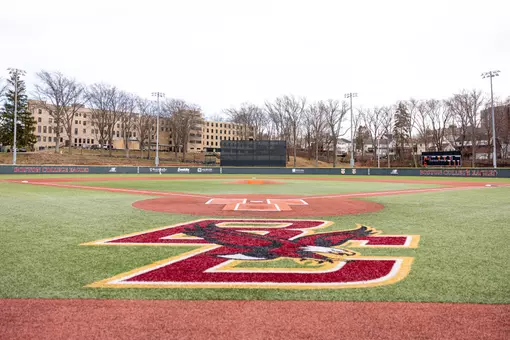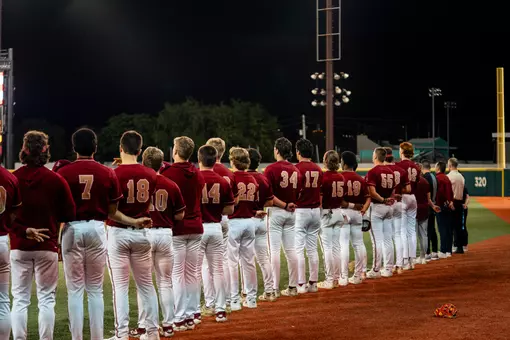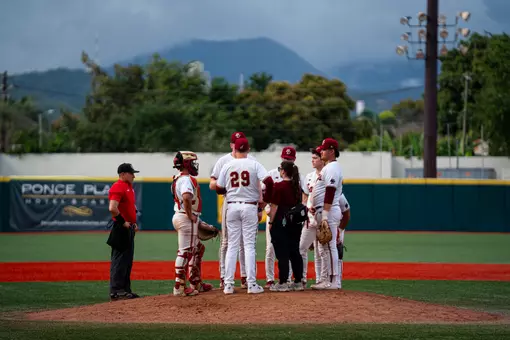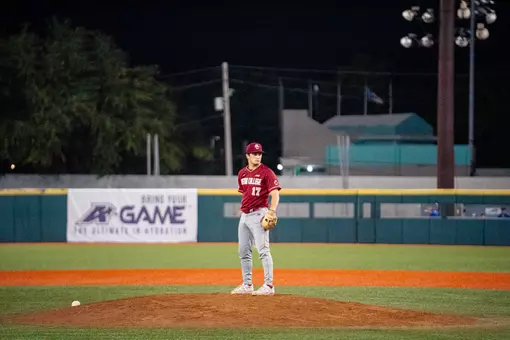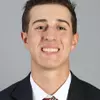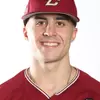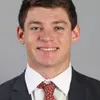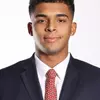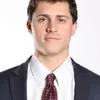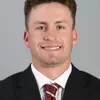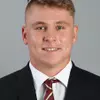Boston College Athletics

Local Talent Truly Making BC "Boston's College Baseball Team"
April 02, 2019 | Baseball, #ForBoston Files
This past weekend is the latest step for the team built around local products.
Sal Frelick strode to the plate in the top of the seventh inning knowing it was a critical juncture. Florida State starting pitcher Shane Drohan ended his game in the previous inning, and Chris Galland led off the seventh with a double off reliever Conor Grady. Even with one out, there was a sense of urgency in Frelick's plate appearance considering Mason Pelio's six sterling innings to that point.
On the second pitch of the at bat, Grady put one right where Frelick wanted it. He swung and connected, driving the ball to deep right field. Right fielder Robby Martin turned but could only offer a few half-hearted jogs towards the fence. It was a no-doubter, a screamer sent long into the Tallahassee afternoon. It was long gone, and any hope of retrieving it as a souvenir was gone with it.
It was Frelick's 34th hit of the season, his third homer and his 18th and 19th RBI. More than that, though, it continued a breakout campaign that's seen him quickly become one of Boston College's biggest team leaders. He is at or near the top of every offensive category for the Eagles, and his name is taking the ACC by storm in the toughest division in college baseball.
More than that, though, Frelick represents part of a revolution of local talent that's becoming part of the Boston College baseball landscape. Nearly 30 members of the roster are from the Northeast, a territory that stretches from New England down to New Jersey and out to Western New York.
"I think the top guys in the Northeast could compete anywhere in the country," head coach Mike Gambino said before the season. "I've always said that. I don't think that this area has the same depth that a lot of places have, but that's fine. If you look at guys like Joe Cronin or Justin Dunn or Mike King or Chris Shaw, those aren't necessarily big-time recruits. Chris was probably a little bit bigger of a recruit, but the majority of our guys have very few scholarship offers."
Massachusetts - and the greater New England or Northeast region - isn't widely known or recognized as one of baseball's fertile recruiting grounds. Perfect Game USA is one of baseball's best recruiting website platforms, and the top names on its list are dotted from states like Texas, Georgia, Florida and California. It is far from a recency bias, and it's proven through the MLB Entry Draft, where 76 high school players went in the First Round, Compensation Round or Competitive Balance Rounds in the last four drafts. Of those 76, only 13 were from "northern states," including zero taken in 2017 and two Canadian athletes taken in 2015.
There's a spillover effect in college baseball, where the cream of the crop rise to the top but others can suffer from the geographical bias. So it becomes paramount for the local "big time" college team to dominate its own home area, which for BC includes that territory down through New York and out to Long Island. When BC moved to the ACC for the 2006 baseball season, it became a power player and forever altered the northeast landscape.
"I think the ACC is a huge factor in our recruiting," Gambino said. "In the Big East, if you go back 25 years, it was a good conference with big leaguers all over the field, but recruiting in the ACC is altogether different. If you're a player and you want to play Power Five baseball, the ACC and SEC are the two best conferences in the nation."
Still, BC had to rise to the forefront by laying a foundation. BC had the allure of power conference baseball but remained the conference's northeast outpost for over a decade. An NCAA Tournament berth in 2009 helped, and Gambino's arrival prior to the 2011 season began the process of laying a new cultural foundation.
"We, as a staff, decided to just find baseball players," he said. "They were kids that some other (recruiter) could knock for not being big enough or not having enough power or having the right speed. Guys like Joe Cronin weren't fast enough. Jake Palomaki, even though he was from Georgia, wasn't big enough. Chris Shaw 'didn't have a position.' Mike King didn't throw hard enough. Justin Dunn wasn't big enough."
The staff instead looked for something else. They wanted the player who ran the hardest and would give every inch of his body for a ground ball. They found the players who had raw tools but weren't necessarily four or five tool guys. They searched for the most intelligent baseball players, who could fail but learn from the failure in order to build a different kind of database. Where other programs looked to amass talent, BC looked to outflank by going after something that would never show up on a stopwatch or radar gun.
"We know the majority of (rookie players) aren't ready for the ACC on day one," Gambino said. "I love multiple sport guys, but that means they've played less baseball. They have less of a database. Northeast baseball players aren't necessarily facing the same depth of competition, then, every day. Chris Shaw was a freshman in the ACC and saw stuff that he had never seen before. So when you watch what players do, it takes development. That's how we're built as a player development program."
With the development came success. BC only won 12 games in 2013 but finished the year with a flourish that led directly to more successful seasons in 2013 and 2014. The 2015 team likely would have made the NCAA Tournament if not for a couple of ill-timed injuries. The 2016 team made the tournament and came within a game of going to the College World Series. That led to a gutting by the MLB Draft, and three years later, the players now picked are on the verge of Major League rosters, while others continue to stick around.
"It's been really cool to see and hear the reputation that our guys perform really well when they get to pro ball," Gambino said. "Mike King and Justin Dunn and Chris Shaw are on the verge of the big leagues, but Joe Cronin was drafted in the (34th round) and advanced to Double-A ball. Blake Butera was drafted late and became a minor league manager at 25 years old. We're getting the reputation that our guys are prepared for professional baseball. Winning is obviously critically important, but if we're doing a great job with development, we can get our guys to professional baseball and win along the way."
That's exactly what's started happening. BC's run of success created a byproduct in its recruiting, and the school became one of the top destinations among local recruits. Then came the capstone with the new Harrington Athletics Village, and all of a sudden, the concept of going to play at Boston College became a destination within its own niche, something that could dominate the local possibilities.
Mike King, for example, came out of Bishop Hendricken High School in Rhode Island, and his success paved the road for Dante Baldelli and Gian Martellini.
Justin Dunn continued opening the door to Long Island and the greater Connecticut-New Jerysey-New York area where recruits like Lucas Stalman, Joe Mancini and Samrath Singh originated.
Chris Shaw played public high school baseball at Lexington High School in Massachusetts, paving the way for Ramon Jimenez, Nick Couhig, Joey Walsh and Sal Frelick. In Frelick's case, it was another product from Lexington, an interesting footnote. These were all athletes with high baseball IQ, but they also started coming with the raw talent that used to leave the area for points south and west.
"There was always a knock that you couldn't win at BC," Gambino said. "The 2009 team went to the tournament, but we didn't get back until 2016 when we were one game away from Omaha. But if you're a recruit, you see the first rounders that come out of BC. That's the true start of a build to the program. That's the start of success, that big leaguers are coming out of here, that we can compete here to go to Omaha."
So when Frelick launched the go-ahead home run into orbit against Florida State on Sunday, it was more than just two runs. It was the next statement about how far Boston College continues to come. BC entered last weekend with four wins against the Seminoles in 39 previous meetings; it nearly swept a nationally-ranked FSU team right off of its home field and, in many ways, likely should have.
As the season progresses, there will be growing pains. The Eagles are still only 14-13 on the year and enter Tuesday's Beanpot opening game feeling like there were at least a couple that got away. But they remain a 5-7 team in the ACC. They are inside the bubble in the race for the ACC Tournament, tied for ninth place with Miami and Wake Forest and despite playing in arguably the toughest division in college baseball. They remain well in the hunt with the No. 3-ranked NC State Wolfpack due to arrive next weekend.
Before that, though, is Tuesday's game against UMass. It's the first game of Massachusetts' college baseball tradition and celebration in the Beanpot. In a state where baseball is an institution and the professional ballpark is a cathedral, BC will look to reclaim its crown and stake its claim to the Boston college baseball throne. It would be fitting, given where it's come from and where it wants to go.
BC will play UMass at the Harrington Athletics Village on Tuesday afternoon at 3 p.m. Admission is free with live audio provided by WZBC. The Beanpot winners advance to the championship game on April 17 at Fenway Park.
On the second pitch of the at bat, Grady put one right where Frelick wanted it. He swung and connected, driving the ball to deep right field. Right fielder Robby Martin turned but could only offer a few half-hearted jogs towards the fence. It was a no-doubter, a screamer sent long into the Tallahassee afternoon. It was long gone, and any hope of retrieving it as a souvenir was gone with it.
It was Frelick's 34th hit of the season, his third homer and his 18th and 19th RBI. More than that, though, it continued a breakout campaign that's seen him quickly become one of Boston College's biggest team leaders. He is at or near the top of every offensive category for the Eagles, and his name is taking the ACC by storm in the toughest division in college baseball.
More than that, though, Frelick represents part of a revolution of local talent that's becoming part of the Boston College baseball landscape. Nearly 30 members of the roster are from the Northeast, a territory that stretches from New England down to New Jersey and out to Western New York.
"I think the top guys in the Northeast could compete anywhere in the country," head coach Mike Gambino said before the season. "I've always said that. I don't think that this area has the same depth that a lot of places have, but that's fine. If you look at guys like Joe Cronin or Justin Dunn or Mike King or Chris Shaw, those aren't necessarily big-time recruits. Chris was probably a little bit bigger of a recruit, but the majority of our guys have very few scholarship offers."
Massachusetts - and the greater New England or Northeast region - isn't widely known or recognized as one of baseball's fertile recruiting grounds. Perfect Game USA is one of baseball's best recruiting website platforms, and the top names on its list are dotted from states like Texas, Georgia, Florida and California. It is far from a recency bias, and it's proven through the MLB Entry Draft, where 76 high school players went in the First Round, Compensation Round or Competitive Balance Rounds in the last four drafts. Of those 76, only 13 were from "northern states," including zero taken in 2017 and two Canadian athletes taken in 2015.
There's a spillover effect in college baseball, where the cream of the crop rise to the top but others can suffer from the geographical bias. So it becomes paramount for the local "big time" college team to dominate its own home area, which for BC includes that territory down through New York and out to Long Island. When BC moved to the ACC for the 2006 baseball season, it became a power player and forever altered the northeast landscape.
"I think the ACC is a huge factor in our recruiting," Gambino said. "In the Big East, if you go back 25 years, it was a good conference with big leaguers all over the field, but recruiting in the ACC is altogether different. If you're a player and you want to play Power Five baseball, the ACC and SEC are the two best conferences in the nation."
Still, BC had to rise to the forefront by laying a foundation. BC had the allure of power conference baseball but remained the conference's northeast outpost for over a decade. An NCAA Tournament berth in 2009 helped, and Gambino's arrival prior to the 2011 season began the process of laying a new cultural foundation.
"We, as a staff, decided to just find baseball players," he said. "They were kids that some other (recruiter) could knock for not being big enough or not having enough power or having the right speed. Guys like Joe Cronin weren't fast enough. Jake Palomaki, even though he was from Georgia, wasn't big enough. Chris Shaw 'didn't have a position.' Mike King didn't throw hard enough. Justin Dunn wasn't big enough."
The staff instead looked for something else. They wanted the player who ran the hardest and would give every inch of his body for a ground ball. They found the players who had raw tools but weren't necessarily four or five tool guys. They searched for the most intelligent baseball players, who could fail but learn from the failure in order to build a different kind of database. Where other programs looked to amass talent, BC looked to outflank by going after something that would never show up on a stopwatch or radar gun.
"We know the majority of (rookie players) aren't ready for the ACC on day one," Gambino said. "I love multiple sport guys, but that means they've played less baseball. They have less of a database. Northeast baseball players aren't necessarily facing the same depth of competition, then, every day. Chris Shaw was a freshman in the ACC and saw stuff that he had never seen before. So when you watch what players do, it takes development. That's how we're built as a player development program."
With the development came success. BC only won 12 games in 2013 but finished the year with a flourish that led directly to more successful seasons in 2013 and 2014. The 2015 team likely would have made the NCAA Tournament if not for a couple of ill-timed injuries. The 2016 team made the tournament and came within a game of going to the College World Series. That led to a gutting by the MLB Draft, and three years later, the players now picked are on the verge of Major League rosters, while others continue to stick around.
"It's been really cool to see and hear the reputation that our guys perform really well when they get to pro ball," Gambino said. "Mike King and Justin Dunn and Chris Shaw are on the verge of the big leagues, but Joe Cronin was drafted in the (34th round) and advanced to Double-A ball. Blake Butera was drafted late and became a minor league manager at 25 years old. We're getting the reputation that our guys are prepared for professional baseball. Winning is obviously critically important, but if we're doing a great job with development, we can get our guys to professional baseball and win along the way."
That's exactly what's started happening. BC's run of success created a byproduct in its recruiting, and the school became one of the top destinations among local recruits. Then came the capstone with the new Harrington Athletics Village, and all of a sudden, the concept of going to play at Boston College became a destination within its own niche, something that could dominate the local possibilities.
Mike King, for example, came out of Bishop Hendricken High School in Rhode Island, and his success paved the road for Dante Baldelli and Gian Martellini.
Justin Dunn continued opening the door to Long Island and the greater Connecticut-New Jerysey-New York area where recruits like Lucas Stalman, Joe Mancini and Samrath Singh originated.
Chris Shaw played public high school baseball at Lexington High School in Massachusetts, paving the way for Ramon Jimenez, Nick Couhig, Joey Walsh and Sal Frelick. In Frelick's case, it was another product from Lexington, an interesting footnote. These were all athletes with high baseball IQ, but they also started coming with the raw talent that used to leave the area for points south and west.
"There was always a knock that you couldn't win at BC," Gambino said. "The 2009 team went to the tournament, but we didn't get back until 2016 when we were one game away from Omaha. But if you're a recruit, you see the first rounders that come out of BC. That's the true start of a build to the program. That's the start of success, that big leaguers are coming out of here, that we can compete here to go to Omaha."
So when Frelick launched the go-ahead home run into orbit against Florida State on Sunday, it was more than just two runs. It was the next statement about how far Boston College continues to come. BC entered last weekend with four wins against the Seminoles in 39 previous meetings; it nearly swept a nationally-ranked FSU team right off of its home field and, in many ways, likely should have.
As the season progresses, there will be growing pains. The Eagles are still only 14-13 on the year and enter Tuesday's Beanpot opening game feeling like there were at least a couple that got away. But they remain a 5-7 team in the ACC. They are inside the bubble in the race for the ACC Tournament, tied for ninth place with Miami and Wake Forest and despite playing in arguably the toughest division in college baseball. They remain well in the hunt with the No. 3-ranked NC State Wolfpack due to arrive next weekend.
Before that, though, is Tuesday's game against UMass. It's the first game of Massachusetts' college baseball tradition and celebration in the Beanpot. In a state where baseball is an institution and the professional ballpark is a cathedral, BC will look to reclaim its crown and stake its claim to the Boston college baseball throne. It would be fitting, given where it's come from and where it wants to go.
BC will play UMass at the Harrington Athletics Village on Tuesday afternoon at 3 p.m. Admission is free with live audio provided by WZBC. The Beanpot winners advance to the championship game on April 17 at Fenway Park.
Players Mentioned
The Podcast For Boston Baseball Edition
Wednesday, February 18
Women's Basketball: Miami Postgame Press Conference (Feb. 15, 2026)
Sunday, February 15
Men’s Hockey: Merrimack Press Conference (Head Coach Greg Brown - Feb. 14, 2026)
Sunday, February 15
Men’s Hockey: Merrimack Press Conference (Oscar Hemming - Feb. 14, 2026)
Sunday, February 15

